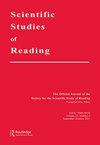Using Eye Movements to Investigate the Impact of Childhood and Recent Frequency of Occurrence on Word Identification During Reading in College
IF 2.4
2区 教育学
Q1 EDUCATION & EDUCATIONAL RESEARCH
引用次数: 0
Abstract
ABSTRACT During reading, high-frequency words consistently receive shorter fixation durations relative to low-frequency words. However, how frequently a given word is experienced can vary across an individual’s education. In the current study, the effects of both childhood and college-level word frequency on fixation durations were examined to assess the relative role of early childhood and recent frequency of occurrence on word identification during reading. Eye movements were recorded as 40 college students read neutral sentences containing 96 target words. The words varied on childhood and college-level frequency. Length of the sentences and pre-target and post-target characteristics were controlled across the four frequency conditions. Data were analyzed via linear mixed models fit to log-transformed fixation duration measures. Three fixation duration measures were examined to explore the time course of processing. Clear effects of college-level frequency were observed on fixation durations on the target words. The frequency with which a word is recently experienced during college affects word identification time in context. This suggests that the effect of word frequency on fixation durations during sentence reading is experience dependent and further supports the need for eye movement experiments to employ age-appropriate recent frequency estimates.运用眼动调查儿童时期和近期发生频率对大学阅读中单词识别的影响
在阅读过程中,高频词的注视时间始终比低频词短。然而,一个给定的单词出现的频率会因个人的教育程度而异。本研究考察了儿童时期和大学时期词汇出现频率对注视时间的影响,以评估幼儿时期和近期词汇出现频率对阅读过程中词汇识别的相对作用。当40名大学生阅读包含96个目标单词的中性句子时,他们的眼球运动被记录下来。这些词的使用频率在童年和大学阶段有所不同。在四种频率条件下,句子长度、目标前特征和目标后特征均受到控制。数据分析通过线性混合模型拟合对数转换的注视时间测量。采用三种注视时间测量方法探讨加工的时间过程。大学水平的频率对目标词的注视时间有明显的影响。一个词在大学期间最近出现的频率会影响词在语境中的识别时间。这表明在句子阅读过程中,词频对注视持续时间的影响是经验依赖的,并进一步支持了采用适合年龄的最近频率估计的眼动实验的必要性。
本文章由计算机程序翻译,如有差异,请以英文原文为准。
求助全文
约1分钟内获得全文
求助全文
来源期刊

Scientific Studies of Reading
Multiple-
CiteScore
7.20
自引率
2.70%
发文量
26
期刊介绍:
This journal publishes original empirical investigations dealing with all aspects of reading and its related areas, and, occasionally, scholarly reviews of the literature, papers focused on theory development, and discussions of social policy issues. Papers range from very basic studies to those whose main thrust is toward educational practice. The journal also includes work on "all aspects of reading and its related areas," a phrase that is sufficiently general to encompass issues related to word recognition, comprehension, writing, intervention, and assessment involving very young children and/or adults.
 求助内容:
求助内容: 应助结果提醒方式:
应助结果提醒方式:


